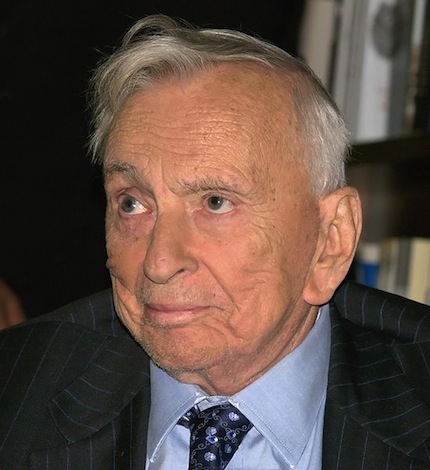SUMMARY
This is AI generated summarization, which may have errors. For context, always refer to the full article.

LOS ANGELES, United States (UPDATED) – US novelist Gore Vidal, the iconoclastic commentator on American life and history in works like “Lincoln” and “Myra Breckenridge,” died Tuesday, July 31, at age 86, his family said.
The writer’s nephew Burr Steers told the Los Angeles Times that Vidal died at his home in the Hollywood Hills of complications from pneumonia.
He was one the giants of a generation of American writers that included Norman Mailer and Truman Capote, as well known for his flamboyant social and sexual life and trenchant political views as for his novels.
“Mr Vidal was, at the end of his life, an Augustan figure who believed himself to be the last of a breed, and he was probably right,” the New York Times wrote in its obituary.
He wrote 25 novels, essays, Broadway hits, screenplays and television dramas in a career that also included unsuccessful runs for political office, celebrated talk show duels, and even an appearance as himself in Fellini’s “Roma.”
His third novel “The City and the Pillar” dealt unabashedly with homosexuality, scandalizing reviewers when it was published in 1948 but breaking new ground in American literature.
Openly bi-sexual himself and contemptuous of prudish mores, he returned to the subject of sexual identity 20 years later in his transsexual satire “Myra Breckenridge.”
Other novels dealt with US politics and history, tracing what he saw as the rise of an American Empire in novels like “Burr” (1973), 1876 (1976), “Lincoln” (1984), “Empire” (1987), “Hollywood” (1990), and “The Golden Age” (2000).
Satires included “Kalki” (1978), “Duluth” (1983) and “Live from Golgotha: the Gospel according to Gore Vidal” (1992).
His politics often sparked controversy.
In a memorable televised exchange, Vidal called William F Buckley a “crypto Nazi,” prompting the conservative columnist to lash out at his onetime childhood friend.
“Now listen, you queer. Stop calling me a crypto-Nazi, or I’ll sock you in the goddamn face and you’ll stay plastered,” Buckley said.
Vidal was said to have been head-butted by Normal Mailer in an off-stage argument before another talk show appearance.
The son of a US army officer, Vidal was born October 13, 1925 at West Point, the US military academy, to a family rich in political and social connections.
His father, an army aviator, was reportedly the love of aviator Amelia Earhart’s life. His mother, who divorced his father, was later married to Hugh Auchincloss, a socialite who was later Jacqueline Kennedy’s stepfather.
He was introduced to politics growing up in Washington where his grandfather was a senator from Oklahoma.
His fascination with political power found its way into his 1967 novel “Washington DC” which tells the story of a political family on the make.
He ran for Congress in 1960 from a district in New York as a democrat, but lost. In 1982, he campaigned unsuccessfully against Governor Jerry Brown in a Democratic gubernatorial primary in California.
In later years, his political views tended toward the conspiratorial, and he was particularly scathing about the administration of president George W. Bush, whom he once called “the stupidest man in the United States.” – Agence France-Presse
Add a comment
How does this make you feel?
There are no comments yet. Add your comment to start the conversation.